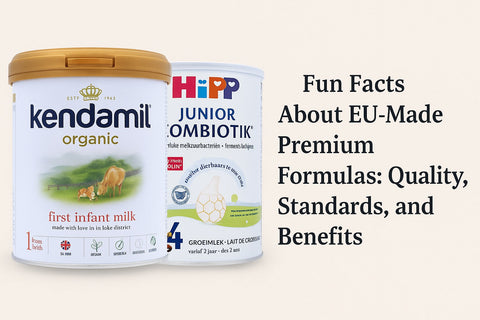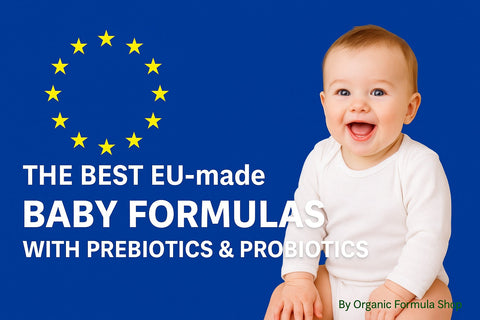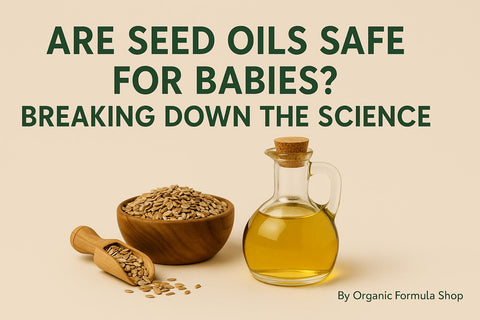Kendamil UK Infant Formula vs. Enfamil: A Guide for Parents
Choosing the right infant formula can feel like navigating a maze, with countless brands vying for your attention. Two prominent names, Kendamil UK Infant Formula (made for the UK and EU markets) and Enfamil, stand out for their presence and commitment to infant nutrition. While both are trusted choices, they differ significantly in their ingredients, regulatory standards, and formulations. This article compares Kendamil UK and Enfamil, spotlighting key differences like the stricter European Food Safety Authority (EFSA) regulations, animal welfare standards, iron levels, and the influence of Operation Stork Speed. We’ll help you make an informed decision to find the perfect formula for your baby’s needs.
Why Compare Kendamil UK and Enfamil?
Kendamil UK and Enfamil are leading brands in the infant formula market, each with unique strengths that make them worth comparing.

Kendamil, a family-run British brand founded in 1962, boasts over 60 years of expertise from its base in the English Lake District. Known for using whole milk from grass-fed cows, avoiding palm oil, and adhering to EFSA standards, Kendamil emphasizes sustainability and natural nutrition. Its formulas, such as Kendamil Organic Cow Formula, Kendamil Classic Cow Formula, and Kendamil Goat Formula, mimic breast milk and cater to various developmental stages and dietary needs.

Enfamil, produced by Mead Johnson Nutrition (a Reckitt subsidiary) since 1905, is a leader in US infant formulas. With a focus on meeting diverse nutritional needs, Enfamil offers specialized options like NeuroPro, Gentlease, and Sensitive, adhering to U.S. Food and Drug Administration (FDA) standards. Widely available, Enfamil is a popular formula for American parents seeking nutrition.
While both brands prioritize infant health, Kendamil UK’s, EFSA-regulated formulas contrast with Enfamil’s FDA-compliant, versatile range. Initiatives like Operation Stork Speed highlight gaps in US formula safety, making this comparison essential for parents.
Kendamil UK vs. Kendamil US: Let’s Clear Up the Confusion
Okay, what’s the difference between Kendamil UK and Kendamil US, and why does it matter? We get it, spotting Kendamil at Target while hearing about a UK version can be puzzling for parents. Let’s sort it out: Kendamil UK, designed for the UK and EU markets, is distinct from the Kendamil sold in US stores. Kendamil UK adheres to strict EFSA regulations, ensuring rigorous ingredient purity, organic farming, and age-specific nutrition with three stages (Stage 1, 2, and 3) and low iron levels (0.5-0.7 mg/100ml in Stage 1) for newborns. In contrast, Kendamil US meets FDA requirements, which are less stringent, permitting certain additives and looser pesticide controls than those banned in the EU. Kendamil US offers only two stages (0-12 months and 12+ months) with higher iron levels (1.2-1.5 mg/100ml), potentially excessive for newborns and possibly causing digestive issues. While both are organic and high-quality, the US version lacks the EFSA’s meticulous oversight, making Kendamil UK the top choice for parents prioritizing premium standards. This distinction matters when choosing between Kendamil UK (available at Organic Formula Shop) and the US version in stores.
Similarities Between Kendamil UK and Enfamil
Kendamil UK and Enfamil share several features that make them popular among parents, reflecting their commitment to infant nutrition:
- High-Quality Ingredients: Both use carefully selected ingredients to support infant growth. Kendamil UK sources organic whole milk, while Enfamil uses nonfat milk and whey protein for nutritional balance.
- Specialized Formula Options: Kendamil UK offers Kendamil Goat Formula for cow milk sensitivities and Comfort Milk for digestive issues. Enfamil provides Gentlease, Sensitive, and AR for fussiness, lactose sensitivity, and spit-up.
- Ready-to-Feed Options: Both brands offer convenient ready-to-feed formulas, like Kendamil Classic Cow Ready-to-Feed and Enfamil liquid formulas.
- Maltodextrin-Free: Neither includes maltodextrin, ensuring cleaner carbohydrate sources.
- DHA and ARA: Both include DHA and ARA for brain and eye development, sourced from algae (Kendamil UK) or synthetic sources (Enfamil).
- Prebiotics: Both incorporate prebiotics (GOS in Kendamil UK and some Enfamil formulas) to support gut health.
- Essential Vitamins and Minerals: Both are fortified with vital nutrients for healthy development.
- Eco-Friendly Packaging: Both use recyclable cans to preserve formula quality and reduce waste.
Key Differences Between Kendamil UK and Enfamil
While both brands excel in infant nutrition, their differences stem from regulatory standards, ingredients, formulation stages, and initiatives like Operation Stork Speed. Let’s explore these distinctions to help you choose the best formula for your baby.
1. Regulatory Standards: EFSA vs. FDA
The most significant difference lies in the regulatory frameworks governing their production:
-
Kendamil UK (EFSA Standards): Formulas like Kendamil Organic Cow Formula and Kendamil Goat Formula are produced under EFSA and EU organic regulations, requiring:
- No synthetic pesticides, fertilizers, or GMOs in ingredient sourcing.
- Strict limits on contaminants and additives.
- Comprehensive safety and nutritional testing.
- High animal welfare standards, including outdoor grazing for cows.
-
Enfamil (FDA Standards): Enfamil adheres to FDA and USDA standards, which are rigorous but less strict than EFSA’s. For example:
- FDA permits specific synthetic nutrients and additives banned in the EU.
- Organic certifications allow limited pasture access and potential pesticide overspray.
- Testing is thorough but less extensive than EU protocols.
Key Takeaway: EFSA’s stricter standards ensure Kendamil UK’s superior purity and nutritional precision, creating a quality gap unlikely to close without significant FDA reform.
2. Animal Welfare Standards in the EU vs. the US
Animal welfare impacts milk quality, a key formula ingredient, and the EU and US differ significantly:
-
EU Animal Welfare Standards (Kendamil UK):
- EU regulations mandate:
- Outdoor grazing for cows promotes natural diets and reduces stress.
- Spacious, humane living conditions.
- Bans on growth hormones and routine antibiotics.
- Kendamil UK sources whole milk from grass-fed cows on family-run UK farms for Kendamil Classic Cow Formula, ensuring ethical, high-quality milk.
-
US Animal Welfare Standards (Enfamil):
- USDA standards require some pasture access but allow smaller spaces and less rigorous humane treatment protocols.
- Growth hormones and antibiotics, even in organic systems, are more common, potentially affecting milk purity.
- Oversight is less frequent than in the EU.
Why It Matters: EU’s higher welfare standards yield purer milk, enhancing Kendamil UK’s formula quality. Parents prioritizing ethical sourcing may favor Kendamil UK.
3. Operation Stork Speed: Addressing US Formula Safety

Launched on March 18, 2025, by Health and Human Services Secretary Robert F. Kennedy Jr. under the Trump administration, Operation Stork Speed is a critical initiative to enhance US infant formula's safety, nutritional quality, and availability of US infant formula. Prompted by the 2022 formula shortage and concerns about contaminants like arsenic and lead, it includes a nutrient review (the first since 1998), increased heavy metal testing, and more transparent labeling. This initiative underscores gaps in FDA oversight compared to EFSA’s stricter protocols, highlighting the need for US formulas like Enfamil to elevate standards. Kendamil UK’s EFSA compliance gives it an edge in purity and safety.
4. Ingredients: Organic Status, Carbohydrates, and Oils
 Kendamil UK and Enfamil differ significantly in their ingredient profiles:
Kendamil UK and Enfamil differ significantly in their ingredient profiles:
-
Organic Options:
- Kendamil UK: Offers organic options like Kendamil Organic Cow Formula, certified by EU Organic and British Soil Association, free from pesticides and synthetic fertilizers.
- Enfamil: Lacks organic certifications, using nonfat milk and some non-GMO ingredients, but with potential trace GMOs from manufacturing.
-
Carbohydrates:
- Kendamil UK: Uses lactose as the primary carbohydrate, mimicking breast milk’s natural sugars for gentle digestion.
- Enfamil: Uses lactose in some formulas (e.g., NeuroPro) but includes corn syrup solids in others (e.g., Gentlease), which may cause blood sugar fluctuations.
-
Vegetable Oils:
- Kendamil UK: Uses organic sunflower, rapeseed, and coconut oils, palm oil-free, in Kendamil Goat Formula.
- Enfamil: Includes palm olein, soy, coconut, and high oleic sunflower oils, with palm oil potentially linked to digestive issues.
5. Iron Levels: A Critical Consideration for Newborns
Newborns have iron reserves sufficient for the first 4-6 months, making excessive iron potentially harmful, causing digestive issues or microbiome imbalances. EFSA-regulated Kendamil UK formulas, like Kendamil Organic Cow Stage 1, have low iron (0.5-0.7 mg/100ml) to suit newborn needs. FDA-regulated Enfamil formulas (0-12 months) have higher iron levels (1.8 mg/100ml), which may be excessive for younger infants, potentially leading to discomfort. The EFSA’s age-specific precision gives Kendamil UK an edge for newborns.
6. Formulation Stages: Tailored Nutrition
Kendamil UK and Enfamil approach developmental stages differently:
-
Kendamil UK Stages (Multiple Stages):
- Stage 1 (0-6 months): Low iron (0.5-0.7 mg/100ml), no starch, for newborns (e.g., Kendamil Organic Cow Stage 1, Kendamil Goat Stage 1).
- Stage 2 (6-12 months): Higher iron (1.0-1.2 mg/100ml) for weaning (e.g., Kendamil Organic Cow Stage 2).
- Stage 3 (12+ months): Adjusted toddler nutrients (e.g., Kendamil Organic Cow Stage 3).
-
Enfamil Stages (Single Stage):
- Infant Formula (0-12 months): Consistent iron (1.8 mg/100ml), potentially high for newborns (e.g., NeuroPro, Gentlease).
- Toddler Formula: Enfagrow for 12-36 months, less specialized than Kendamil UK’s stages.
Environmental and Sustainability Practices

Kendamil UK excels in sustainability, sourcing whole milk from local, grass-fed UK farms for Kendamil Organic Cow Formula and Kendamil Goat Formula. It avoids palm oil, uses recyclable cans, and employs energy-efficient production in the Lake District, adhering to EFSA’s eco-conscious standards. Enfamil focuses on recyclable packaging but lacks Kendamil UK’s local sourcing or palm oil-free commitment. Its broader manufacturing scope limits sustainability compared to Kendamil UK’s regional focus.
Why It Matters: Kendamil UK’s sustainability appeals to eco-conscious parents, while Enfamil suits those prioritizing accessibility.
Conclusion: Why Kendamil UK Stands Out
Both Kendamil UK and Enfamil offer high-quality formulas, but Kendamil UK’s EFSA compliance, organic whole milk, and stage-specific formulations make it superior. Enfamil’s specialized options and affordability are commendable, but its use of corn syrup solids and palm oil, plus less rigorous FDA oversight, place it behind Kendamil UK.
Kendamil UK’s natural, palm oil-free formulas and diverse options (including goat milk and ready-to-feed) are unmatched for parents seeking premium infant nutrition. Enfamil is ideal for accessibility and specialized needs, but Kendamil UK leads in quality.
Order your Kendamil UK Formula Here. ***We ship every order (for free!) in just 2 to 4 business days, faster than anyone else, anywhere in the US! ***
Contact
Contact our dedicated customer support team for expert advice and guidance tailored to your baby's needs. They have earned hundreds of 5-star reviews from our customers, helping you to provide the best nutrition for your little one. Contact us here or shoot us an email at support@organicformulashop.com. We're here to help!
Disclaimer: The information provided in this blog reflects the current product details from Kendamil and Enfamil as of the publication date. While we strive to provide accurate and up-to-date information based on official brand sources, we have not independently verified all specifics. Product formulations, ingredients, packaging, and other details may change without prior notice. We recommend checking the latest information and consulting healthcare professionals or pediatricians before deciding on infant formula feeding.




